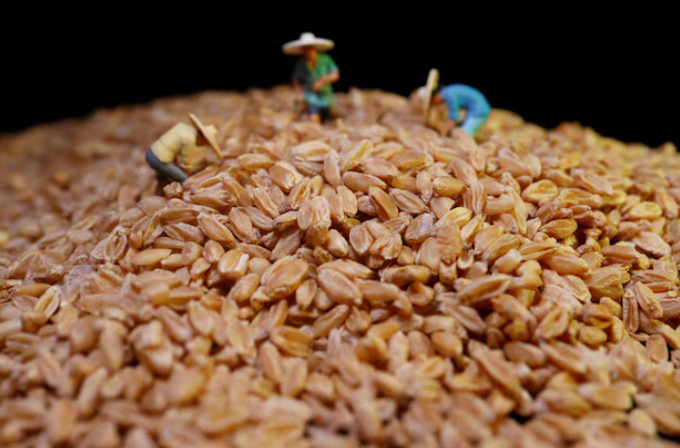May 21, 2025 | 10:20 GMT +7
May 21, 2025 | 10:20 GMT +7
Hotline: 0913.378.918
May 21, 2025 | 10:20 GMT +7
Hotline: 0913.378.918

Wheat kernels are displayed with farmer miniatures in this illustration picture taken June 20, 2023. Photo: Purchase Licensing Rights.
China has in the past year ramped up approvals of genetically modified (GM) corn and soybean seeds that are higher-yielding and resistant to insects and herbicide to secure its food security, but the uptake remains slow and cautious due to concerns about the impact to health and ecology.
Unlike genetic modification, which introduces foreign genes into a plant, gene editing alters existing genes to change or improve its performance and is viewed by some scientists as less risky than genetically modifying them.
China mostly imports GM crops such as corn and soybeans for animal feed and grows non-GM varieties for food consumption. Many Chinese consumers remain concerned about the safety of GM food crops.
The approval for the gene-edited disease-resistant wheat is seen as a milestone, as the ingredient - used to make pasta, noodles and bread - is predominantly grown in China for food consumption. China is the world's largest wheat producer and consumer.
"It is a big step, we can see the light for China to open up approvals for other food crops," said a seed industry executive.
Beijing is also expected to pass new rules this year for the labelling of genetically modified crops used in food products, state media reported in March.
The agriculture ministry on Wednesday also approved a new variety of genetically modified corn with herbicide and insect-resistant traits, as well as one gene-edited corn variety that is higher yielding.
The GM corn approval includes a variety by Origin Agritech (SEED.O), opens new tab.
The safety certificates have been approved for five years from May 5, according to a document published by the Ministry of Agriculture and Rural Affairs.
The world's biggest buyer of soybeans and corn aims to raise domestic production through higher yielding seeds and cut its grains imports of more than 100 million metric tons a year.
(Reuters)

(VAN) Attempts to bring down the price of the Japanese staple have had little effect amid a cost-of-living crisis.

(VAN) Fourth most important food crop in peril as Latin America and Caribbean suffer from slow-onset climate disaster.

(VAN) Shifting market dynamics and the noise around new legislation has propelled Trouw Nutrition’s research around early life nutrition in poultry. Today, it continues to be a key area of research.

(VAN) India is concerned about its food security and the livelihoods of its farmers if more US food imports are allowed.

(VAN) FAO's Director-General emphasises the need to work together to transform agrifood systems.

(VAN) Europe is facing its worst outbreak of foot-and-mouth since the start of the century.

(VAN) The central authorities, in early April, released a 10-year plan for rural vitalization.